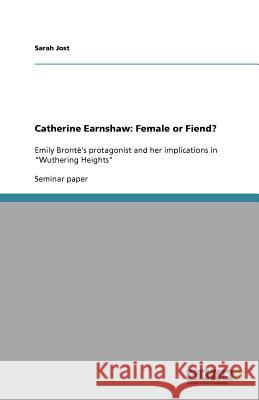Catherine Earnshaw : Female or Fiend? » książka
Catherine Earnshaw : Female or Fiend?
ISBN-13: 9783640952625 / Angielski / Miękka / 2011 / 36 str.
Seminar paper from the year 2006 in the subject English Language and Literature Studies - Literature, grade: 1, Justus-Liebig-University Giessen, course: 19th Century Women Writers I: the Brontes, language: English, abstract: The character of Catherine Earnshaw is one of the most complex and fascinating in world literature. Her story is that of a young woman who "betrays her deepest self and so destroys herself" but whose love is so strong that not even death can extinguish it. Readers cannot help but be moved by her fate, even though she appears to be a thoroughly unpleasant person in more than just one respect. They are forced to pity her, even though they feel they have every reason to believe that it is her, and her alone, who is to blame for the misery that befalls her. And, worst of all, they see her suffering and dying, but at the same time they cannot help envying her ability to feel as strongly as she does. These confusing and seemingly contradictory impressions have led many critics of the novel to describe Catherine using terms like "creature of another species, hysterical, savage or demonic" out of a sheer inability to make anything else of her, anything that they could understand. In this paper, I shall attempt to determine whether these "otherwordly" terms that reek of madness and hell are really necessary or whether it might not be possible to do without them and see Catherine simply as a young woman in a very 18th/19th-century dilemma, a girl who marries the wrong man and ends up heartbroken. I will begin by attempting a characterization of Catherine and then introducing her author, Emily Bronte, to have a closer look at the world and the mind that Catherine is rooted in. Finally I will try to discover the true nature of Catherine's dilemma and whether all these aspects will make it possible to demystify Catherine and return her to the state of a human being.











